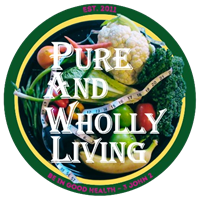Firstly, honey is not just one of the oldest cultivated “health” foods, but also one of the most delicious natural sweeteners. And, it is loaded with nutrients and antioxidants.
Now, I’m sure you’ve heard of plain ol’ honey, but what about raw honey? Not sure what the difference is? Below, is a rundown on all things honey—including how to tell raw honey from regular honey, as well as its benefits and side effects.
“Regular” Honey vs. Raw Honey
Raw honey is essentially honey straight from the hive, meaning it hasn’t been heated or pasteurized, like most conventional honey is today.
When it comes to telling raw honey apart from other types of honey, you can pretty much know just by looking at it. “Regular” honey is transparent and clear yellow. (This is the kind you usually see in honey bear jars). It’s thin and amber-colored, which means it’s been heated and processed. This type of honey does not have the same nutritional benefits, nor the same antibacterial, antiviral, and antifungal properties as raw honey. Raw honey is opaque, thick, and creamy, and you’ll find it at health food stores, farmers markets, and specialty food retailers.
Health Benefits of Raw Honey
The benefits of raw honey are sort of endless—it’s antibacterial, antimicrobial, anti-inflammatory, etc.—but below is a non-comprehensive list of the benefits you may see when you add raw honey to your diet.
1. Raw honey is a great source of antioxidants.
Raw honey is packed with antioxidants—molecules that protect our cells against free radicals, which contribute to the development of many diseases. According to the National Institute of Health, honey contains phenolics, polyphenols, peptides, organic acids, enzymes, and more. Consuming foods with antioxidants can reduce the risk of heart disease, cancer, and Alzheimer’s, among other diseases.
2. Raw honey can help with digestive issues.
In Ayurvedic medicine, honey is used to help those with weak digestion, and studies show that it can improve one’s gut microflora (which is good for digestion). Honey has also been used to treat constipation and other gastrointestinal diseases.
3. Raw honey is good for soothing a sore throat.
We all know someone who has put honey in tea or warm water in an effort to ease their sore throat… and it turns out that remedy is totally valid. Honey acts as an anti-inflammatory and antibacterial agent, which can offer pain relief for someone with a sore throat. In fact, one study found that honey was superior to antibiotics for upper respiratory tract infections (and it eased subjects’ coughs), so it makes sense that honey could relieve an irritated, inflamed throat.
4. Raw honey can help with healthy weight management.
A sweetener that can help you maintain your weight? Shocking, huh!?! There’s probably more research to be done here, but a 2018 study found that honey actually reduced blood sugar levels and prevented excessive weight gain in subjects with metabolic syndromes (including obesity, diabetes mellitus, dyslipidemia, and hypertension). Similarly, another study revealed that when compared to sugar, honey may reduce weight gain and obesity.
5. Finally, raw honey can be helpful for those with diabetes.
While there’s no denying that honey contains sugar, multiple studies have demonstrated that compared to dextrose (sugar), honey caused a lower elevation of plasma glucose level (PGL) in people with diabetes. That said, anyone with diabetes should talk to their doctors before regularly introducing honey into their diet. One study found that while honey consumption provided beneficial effects on body weight and blood lipids of diabetic patients, it also caused an increase in hemoglobin A(1C) levels. So if you have diabetes, it’s wise to proceed with caution.
Possible side effects of consuming raw honey
It’s rare for people to experience negative side effects from eating raw honey, but in the interest of arming you with all the information, these are a few potential drawbacks.
You could consume harmful bacteria
Because raw honey isn’t pasteurized, there is an off-chance that it contains harmful bacteria. In particular, raw honey can carry Clostridium botulinum—a bacteria that produces toxins. This bacteria isn’t a major threat for adults, but there have been cases where infants who ingested honey developed botulism, a type of food poisoning, and paralysis. Is it likely? No. But is it reason enough to keep your infant away from raw honey? We would think so.
You may experience an initial short period of diarrhea and vomiting
While honey is often used to treat gastrointestinal issues, it can also cause diarrhea in some people. Studies attribute this to the high levels of glucose in honey causing a laxative effect. Also, honey from certain geographical regions (often referred to as “mad honey”) can sometimes cause nausea and vomiting. Again, this isn’t likely, but it’s good to be aware of the risks, however small they are.
You could experience more severe symptoms.
To drive home the point once more: Infants less than one year old should not be fed raw honey. Some infants have experienced symptoms after consuming raw honey, like constipation, blurred vision, and muscle weakness. You should avoid feeding your infant raw honey, but if they somehow end up consuming it, it’s best to contact emergency medical services right away.
Other interesting facts about raw honey
- Raw honey has a eternal shelf life
- Raw honey is one of the oldest cultivated foods
- Making raw honey is a group effort—so say thank you to the bees!
- Raw honey can help heal wounds and prevent infection
- Raw honey may boost your fertility
- Raw honey could help reduce your allergies.
- It takes a lot of bees (and work) to make honey: Besides giving us delicious and nutritious honey, honeybees pollinate over 80% of our food crops, making them an integral part of our food supply. You can help save the bees, (and therefore both honey and our food supply!) by choosing organic produce, planting an organic garden, or adding a beehive to your backyard!
Adapted from Maria Marlowe, CHC
